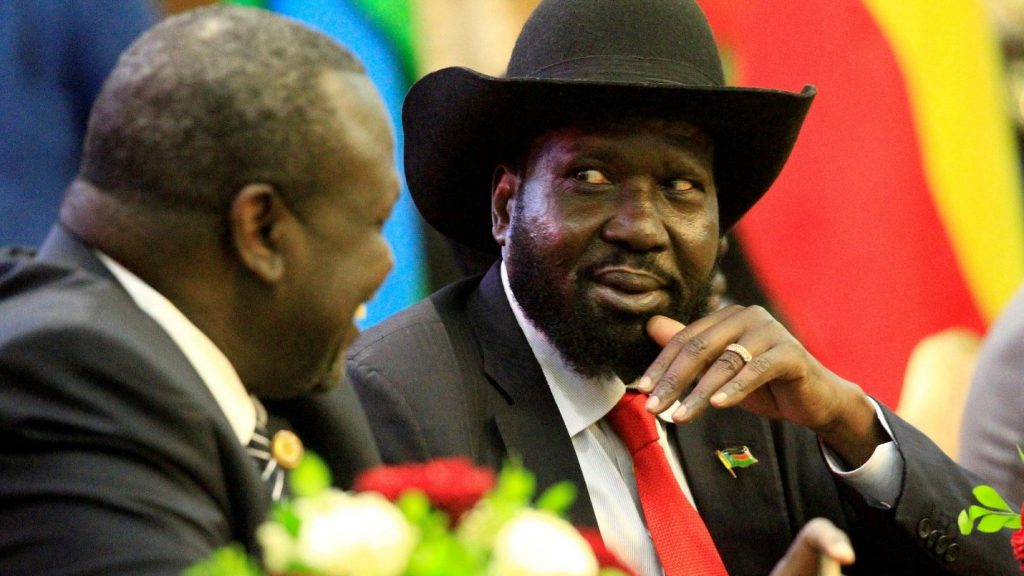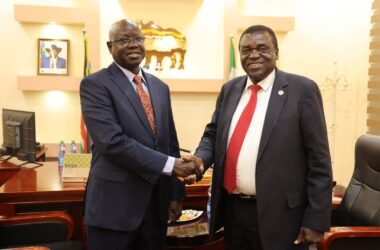
President Salva Kiir (R) and FVP Dr. Riek Machar during the signing of the 2018 peace deal/Photo: Courtesy
By Philip Buda Ladu
The 22nd of February 2022, marked exactly two years since President Salva Kiir formed the Cabinet as per the Revitalized Transitional Government of National Unity (R-TGoNU), kick-starting the 36 months transitional period.
With now barely 12 months to the end of the transitional period, most provisions of the Revitalized Peace Agreement are not implemented.
Up to date, the Necessary Unified Forces (NUF) are not graduated which is a crucial component of the security arrangements for the unification of forces that guarantees the implementation of the 2018 peace pact.
Even when most of the chapters of the agreement have not been fully implemented, the parties to the agreement are already spearheading campaigns for an election to be conducted at the end of the transitional period to bring in a constitutionally elected gov’t.
Aspects of reforms that are expected as highlighted in the Revitalized Peace Agreement such as the reconstitution of different institutions including the Election Commission, the Political Parties Council, and other reforms agenda that deal with the national economy like the Ministry of Finance, the Central Bank and the NRA are behind schedule.
Dr. Abraham Kuol Nyuon, an Associate Professor of political science and the Dean of the School of Economic and Social Studies in the University of Juba said the implementation of the peace agreement has got both negative and positive aspects for the last two years.
“First of all, the positive thing is that the parties that had not been trusting each other are currently working together in Juba in harmony and there has been no reports of serious confrontations despites the few challenges where their armies are,” he said.
He said the other positive thing is the completion of the implementation of Chapter one which is the formation of the Executive organs of governments both at national and States and the legislature.
Dr. Nyuon said, “one of the major pillars of the current peace agreement is chapter two that is dealing with security arrangement which has been at stalemate for long and this is now the indication that probably the parties might have been willing to prolong their position within the leadership because the lack of security arrangement might be put forward by the end of one year as the reason for extension”.
He said as a result, one would describe it as something that is intentionally made by both the parties.
Dr. Nyuon said those reforms have not been happening, which is something that goes with chapter three which deals with issues of resources also and chapter four which goes with peace and reconciliation.
“At this specific point despite the fact that most parts of the current peace agreement have not been dealt with, there is hope that probably as our leadership continue to work together and try to join hands and agree with the resolutions of the Presidency and the Council of Ministers and the parliament put a lot of pressure at the cabinet then we might see light at the end of the tunnel”.
Dr. Nyuon said there is possibility of elections to be done if the government would wish to do so.
“You know that probably the institutions that are dealing with elections are supposed to have been set in place but currently as I speak there are no indicators that everything that’s happening is pointing towards elections being successful in this country,” he exclaimed.
He said what the leaders need to do in the next remaining one year into the end of the transitional period is to build confidence within the general population, for instance going around the country assuring the people that they have been in the gov’t for two years and they are ready to go for election.
However, there are already divergent views on the conduct of the elections as the opposition is saying there will be no credible elections and the SPLM-IG is saying there will be elections.
The political analyst underscored that for a credible free and fair elections to be conducted in 2023, it will be determined on how the R-TGoNU is working in the next three to six months towards meeting the prerequisites to ensure the conduct of credible elections.
“The major indicators happening now is that there are high chances that the current R-TGoNU will use the excuse of the lack of security arrangements or the reintegration and unification of the army as an excuse for the next extension and I think the citizens will go along with such extensions as long as it is” asserted Dr. Nyuon.
He reiterated that the government should at least be able to do something before the remaining twelve months elapsed so that when they extend the transitional period, it shall have the trust of the citizens.
South Sudan has been going through transitions since its independence in 2011, Dr. Nyuon said it is the right time now for the country to exist through transitions by having a permanent constitution and the constitution should be able to take the people to elections.
He wished that every government’s institution should be able to play their role as they are landing towards the end of the transitional period.
“The parliament should be able to speed up all the necessary policies and legislations that are required for people to come out of transition, especially the Elections Act, the Political Parties Act and the Constitution and at the same time the executive should be able also to perform their work by trying to ensure that the reform agenda is seen within their institutions and finally the Judiciary should keep an eye that keeps the law by making positive rulings within the context of the law,” Dr. Nyuon submitted on the elections possibilities.



